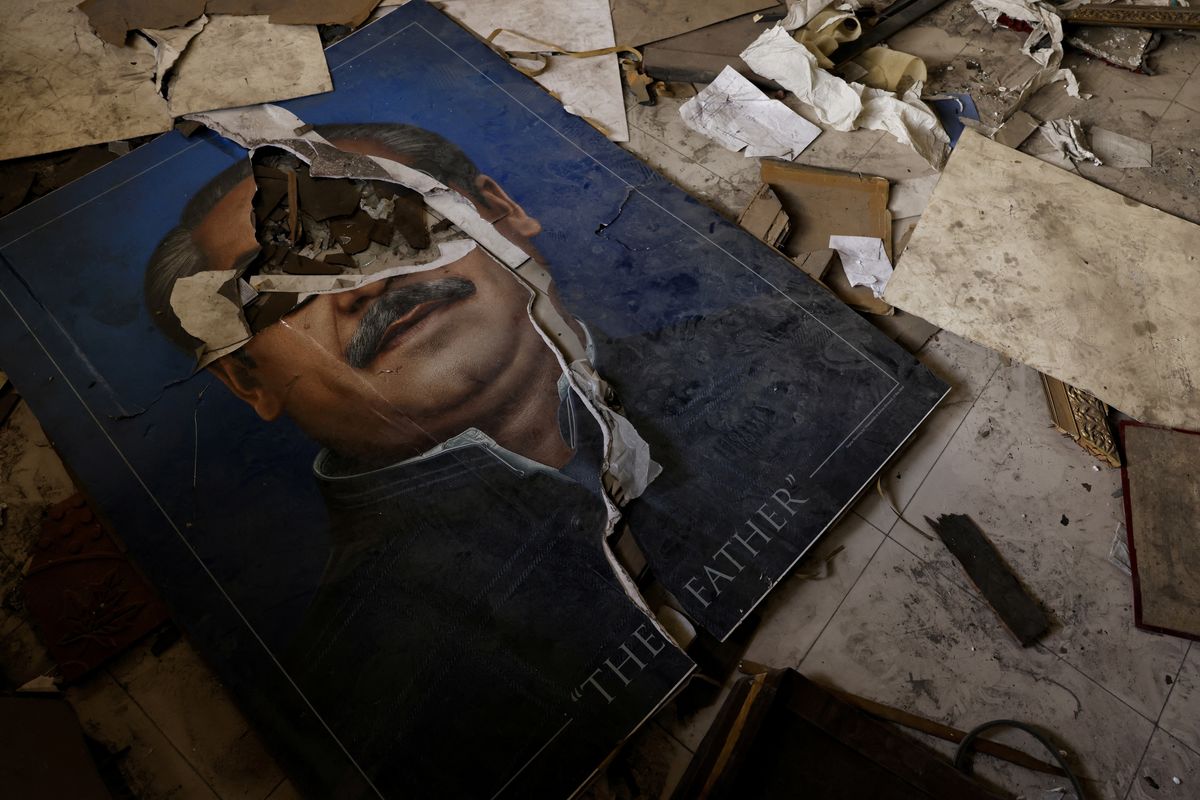Bangladesh's battle for identity after Hasina’s fall
South Asian nation revisiting its history and redefining friendships after July revolution

Sidrah Roghay
Senior Producer
Sidrah Roghay is a storyteller at heart, with over a decade of experience in newsrooms across Pakistan, the US, and Turkey

A vandalised photograph of Bangabandhu Sheikh Mujibur Rahman, father of the ousted PM Sheikh Hasina, is seen inside his demolished Dhanmondi-32 residence, in Dhaka, Bangladesh February 6, 2025.
Reuters
Army stood on sidelines and watched as protesters demolished Mujib's house, eye witnesses say
6 months after ouster, Hasina remains unapologetic over July killings, protesters say
With tensions rising with former ally India over Hasina's extradition, interim government looks toward Pakistan
Bangladeshis across the spectrum were stunned as protesters bulldozed the home of Sheikh Mujibur Rahman, the country's founding leader. For many, it was more than just an act of vandalism—it was an attack on the nation's identity.
On a cold February night, protesters gathered with bulldozers, cranes and hammers to demolish the national monument Dhanmondi 32, where Mujibur Rahman and most of his family were assassinated by army troops in 1975.
Sheikh Hasina, Mujib’s daughter and Bangladesh's longest-serving prime minister, turned the house into a museum. Six months ago, she fled to India amid student protests that she tried to quell leaving up to 1,400 people dead, according to UN investigators.
The protesters who tore down the national monument in the capital Dhaka were driven by their deep resentment toward her.
"The protesters had gathered outside the house to stop her live address to supporters,” said Kamruzzaman, a journalist who was present at the scene on Feb. 6.
In her speech, Hasina focused on cases lodged against her and did not apologize for the killings last summer, said Kamruz, speaking to Nukta on the phone.
"They can demolish a building, but not the history. History takes its revenge," Hasina, 77, said in her speech via video link.

The South Asian nation of 170 million people is struggling with political strife since the ouster of Hasina. The interim government led by Nobel laureate Muhammad Yunus has struggled to maintain law and order as protests and unrest have continued.
Over the demolition which continued for two days, Yunus's government gave a half-hearted response blaming Hasina.
"Sheikh Hasina has insulted and humiliated those who sacrificed themselves in the July uprising. Sheikh Hasina has threatened to create instability in the country," Yunus's press office said in a statement.
Eyewitnesses told Nukta that army troops at the scene stood on the sidelines while the national monument, where Mujib declared the independence of Bangladesh, was torn apart.
"What the protesters did was absolutely disgusting as army troops stood and watched,” said Mahid Imran, a political analyst based in Dhaka.
“According to my knowledge, some low-ranking army troops were involved in the action,” he told Nukta over the phone.
"We are heading toward a civil war,” he added.
With Hasina's Awami League party removed from power, a political vacuum has emerged. Some fear Islamist groups, emboldened by the lifting of bans on parties like Jamaat-e-Islami, are gaining influence.
“Those who demolished the Dhanmondi 32 residence did so because they harbored grudges against it, and the reasons for their grudges are that it represented everything contrary to what these Islamists believe,” said Syed Ahmed Ali, whose family sponsors Urdu scholarships for students at Dhaka University.
“This house has been hated for generations by all Islamists who have resisted Bangladesh's liberation, especially Jamaat-e-Islami,” Ali told Nukta on phone.

“As a sign of their Islamist victory, they chanted Allahu Akbar and raised ISIS-type flags after demolishing the house,” he added.
The sentiment that Islamists will flex their muscles after secular Hasina's rule ended is shared by many people. Reports in international media claim that women are facing difficulties in doing business and football matches for girls were stopped in some villages. The interim government's softened stance on Jamaat-e-Islami is evident in the omission of its name from revised school history books, despite its alleged role in killing Bengali intellectuals in the final days of 1971 war.
This view is echoed by the Awami League, which in a video shared from its official Youtube channel, expressed concern about the demolition, saying it was carried out by 'Islamist' forces.
Kamruz takes this with a pinch of salt. “I was there. I saw some people chant Allahu Akbar but no ISIS flags were raised. As far as news about calling off football matches is concerned, these things have always occurred in far-flung areas. Even during Hasina's rule,” he said.

As the dust settles on the destruction of Mujib's historic home, Bangladesh’s political landscape remains fraught with uncertainty.
With Hasina in exile in India, tensions between Dhaka and New Delhi are growing. Bangladesh’s interim government has formally requested Hasina’s extradition and revoked her passport. However, India has yet to respond, straining relations between the two neighbors and former allies.
Adding to the geopolitical complexity, Bangladesh has moved to strengthen ties with Pakistan—once its adversary in the 1971 war. The two nations are in talks to resume direct flights after seven years, and diplomatic visits at the highest levels are reportedly in the works. Negotiations are underway for launching a passenger ferry service and establishing direct sea routes, further reinforcing regional cooperation and opening new economic opportunities.
Meanwhile, Hasina's fall from grace has been swift. Once a dominant force in Bangladeshi politics, her political future looks increasingly bleak. How the nation navigates this transition is something that only time will tell.







Comments
See what people are discussing